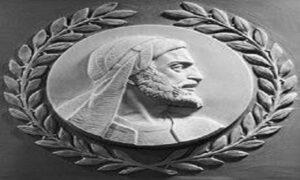Doctor Curmudgeon® A Medieval Rabbi and Physician
By Diane Batshaw Eisman, M.D. FAAP Doctor Eisman is in Family Practice in Aventura, Florida with her partner, Dr. Eugene Eisman, an internist/cardiologist
In the Middle Ages, there dwelt a renowned rabbi and physician by the name of Moses ben Maimon.
Moses ben Maimon was more commonly known as Maimonides.
The Middle Ages was not a time of accurate birth recordings. And so Maimonides was born on March 30 or April 6 in 1135 –or maybe it was March 28 or April 4 in 1138.
His earliest rabbinic writings displayed a strong interest in medicine. And as he grew older, he trained as a physician. He did not simply accept the medical theories of his time, but questioned current medical practice and relied on his own observations and personal experience.
With his exceptional approach to medicine, his fame and reputation spread to other countries and to Egypt.
In recognition of his skills, this Jewish doctor was appointed court physician to the Egyptian Sultan Saladin.
By 1190 he had devoted himself entirely to the practice of medicine; no longer having time to study the Torah (the first five books of the Hebrew bible) or to perform rabbinical duties.
Maimonides stressed respect in the care of patients. Isaac Shailat translates from Maimonides’ The Guide For the Perplexed: “I go forth to attend to my patients, and write prescriptions and directions for their various ailments. Patients go in and out until nightfall, and sometimes even…until two hours or more into the night. I converse with them and prescribe for them even while lying down from sheer fatigue; and when night falls, I am so exhausted that I can hardly speak.”
In emphasizing a healthy lifestyle, this medieval physician was quite modern for his time. Maimonides wrote The Guide to Good Health in Arabic, becoming the first medical book to be published. However, this was not until 1477 after being translated into Latin.
He was progressive in his thoughts about public hygiene and preventive medicine, and urged physicians to approach suffering patients with care and consideration. For Maimonides, there had to be a close relationship between doctor and patient in order for the physician to be trusted.
It seems likely that Maimonides had little time for rest and sleep. This busy practicing physician wrote treatises on asthma, pneumonia, diabetes, hepatitis, seizures and poisons and their antidotes.
Maimonides was unique in urging that basic medical knowledge be available to everyone; medical studies should be an important part of a general education.
He even went so far as to point out that judges could better adjudicate with an understanding of basic medicine.
This brilliant, forward thinking man is remembered for many things, but many of us honor him by reciting the Oath of Maimonides.
It is an oath recited to affirm the calling of a physician and in part says: “May the love for my art actuate me at all times; may neither avarice nor miserliness, nor thirst for glory or for a great reputation engage my min…May I never see in the patient anything but a fellow creature in pain…I am ready for my vocation and now I turn unto my calling.”
THE PICS ARE OF A BAS RELIEF OF MAIMONIDES IN THE UNITES STATES HOUSE OF REPRESENTATIVES AND THE STATUE IS A MONUMENT IN CORDOBA.
Dr. Curmudgeon suggests “Bitter Medicine”, Dr. Eugene Eisman’s story of his experiences–from the humorous to the intense—as a young army doctor serving in the Vietnam War.
Bitter Medicine by Eugene H. Eisman, M.D. –on Amazon
Doctor Curmudgeon® is Diane Batshaw Eisman, M.D., a physician-satirist. This column originally appeared on SERMO, the leading global social network for doctors.
SERMO www.sermo.com
Click Here to Order Boxing Interviews Of A Lifetime By “Bad” Brad Berkwitt


